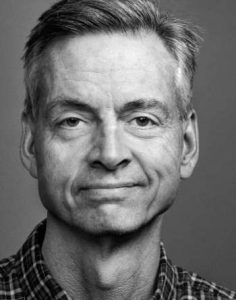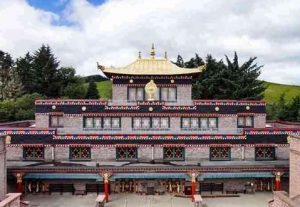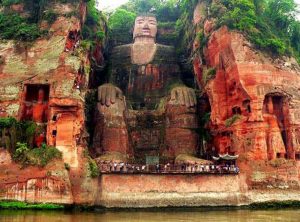
The revered Korean Dharma master and Buddhist activist Venerable Pomnyun Sunim (법륜스님) and volunteers from the Buddhist humanitarian relief organization JTS Korea conducted relief efforts in the northeastern Indian state of Assam on 12 July in response to catastrophic flooding that has affected the region during the recent monsoon season.
Two months of monsoon rains have inundated northeastern India and eastern Bangladesh, with prolonged heavy rains, particularly during the middle of June, causing widespread floods and landslides as river levels rose to dangerous levels. Media reports indicated that 79 people had been killed in the flooding, with more than 300,000 displaced as the flood waters submerged homes and inundated farmland. Assam regularly experiences large-scale destruction with each monsoon season due to its expansive network of rivers.
JTS Korea’s emergency relief team was dispatched to Assam on 9 July to conduct a preliminary survey of conditions on the ground and to prepare relief supplies. Among the areas surveyed, the village of Puragaon in Morigaon District was found to be in a particularly precarious situation, having received no external aid.
Ven. Pomnyun Sunim established the humanitarian relief organization Join Together Society (JTS) as an expression of the compassion of engaged Buddhism, and based on the principle that helping others is the best way to enrich one’s own life. Charged with bringing hope, empowerment, and self-reliance to underprivileged communities in developing countries, JTS is run and manned by unpaid volunteers, who ensure that all donations benefit marginalized communities. JTS carries out relief work in countries suffering from humanitarian disasters, and has engaged in humanitarian projects in Bangladesh, Cambodia, Laos, Myanmar, the Philippines, and Sri Lanka. The relief organization has also earned Special Consultative Status to the United Nations Economic and Social Council (ECOSOC).
When Ven. Pomnyun Sunim arrived, three villages in the area were submerged beneath floodwaters, affecting 1,067 households. The displaced residents had been living in tents on an intact riverbank for a week.
“If this river breaks its banks, the damage will be enormous. To avoid flood damage, people shouldn’t live outside the riverbank, but due to poverty, they have no other place to live,” Ven. Pomnyun Sunim observed.
Although some initial government food aid had finally reached the area, it was only sufficient for four days, and now, due to the absence of further rains, the government had ceased delivering support.
The team of five JTS volunteers worked with local volunteers to rapidly prepare food packs of rice, dal, oil, and salt, as well as baby formula and urgently needed mosquito nets to distribute to the residents.
After inspecting the flood-affected area, Sunim headed to the designated relief distribution area. Before the JTS team began distributing the supplies, Sunim offered words of comfort and encouragement for the displaced people.
“Were you caught off-guard by the heavy rains? Is everyone safe? Did you lose any animals?” he enquired. “I extend my condolences to those who have lost so much due to the sudden flooding. Although it may not be much, we hope that the supplies we provide today can be of some help. Please maintain order and receive the supplies one by one.”
Sunim then led the JTS volunteers in distributing relief supplies, unloading bags of rice and ensuring everyone received their share. Women with babies were given additional formula and biscuits.
The village head expressed gratitude on behalf of the residents: “Although the entire Assam State suffered from the flood, no one came to help this area. But JTS came to us. We are truly grateful.”
The JTS emergency relief team distributed relief supplies to three villages over the next two days. Ven. Pomnyun Sunim provided some guidelines to encourage them in their work and to ensure the relief operations were carried out smoothly.
“Safety is always the most important when distributing relief supplies. If distribution is scheduled for 7 a.m., only those who arrive before 7 a.m. should receive the supplies,” Sunim explained. “Those who arrive later should wait outside. Otherwise, those who arrived early will protest. Also, set up stakes and lines so that people can queue in a single file. In this way, order can be maintained. For the elderly who aren’t strong enough, young people from the village should receive and carry supplies for them.
“Once the initial distribution is complete, line up the latecomers and distribute to them. This doesn’t mean that latecomers won’t receive supplies, but if latecomers keep cutting in, it will cause confusion. If it rains heavily and most people are late, postpone the distribution by an hour or two. Begin when a enough people have gathered. If you consider each individual’s circumstances, the entire system will collapse, leading to disputes. Please prioritize safety . . . let’s all work together to ensure fair distribution. . . . During distribution, there will always be latecomers, people who lose their coupons, and those who ask for more even after receiving once. Our goal is to minimize such issues, not to eliminate them completely.”
After ensuring that the humanitarian operation was proceeding smoothly, Ven. Pomnyun Sunim departed for Assam’s second-largest city, Silchar, where he met with Dr. Ravi Kannan, a 2023 recipient of Asia’s prestigious Ramon Magsaysay Award. Dr. Kannan is the director of the non-profit Cachar Cancer Hospital and Research Centre (CCHRC), which provides oncological treatment to thousands of underprivileged cancer patients each year.
“When patients first arrive here, they receive counseling,” Dr. Kannan explained. “The initial visit is critical because most patients come with immense fear about their condition. We carefully explain the support available. At this hospital, paying 500 rupees (US$6) during the first consultation covers all future treatment costs. This is to ensure that the financial burden doesn’t prevent patients from receiving care.”
“You are doing wonderful work,” Ven. Pomnyun Sunim affirmed.
“[The hospital operates] until the last patient is seen,” Dr. Kannan continued. “There is no set closing time. Since patients come from far away, our principle is: if someone comes, we must see them. This ensures that no poor patient who has traveled a long distance leaves disappointed. . . .
“This hospital has no special rooms for those who can pay more. All patients pay the same and receive the same care. If we were to charge more from those who could afford it, we would have to give them special treatment, which would mean less care for the poor. . . .
“As you know, cancer treatment and surgeries require a lot of blood. It used to be difficult to secure blood, so we had to ask which family member would donate blood right from the start. To alleviate this burden, we established a system for general citizens to donate blood. The response has been overwhelming, so we no longer need to ask families for blood donations. . . .
“Under usual circumstances, it takes 3–10 days to issue biopsy results. Here, we’ve developed a system to get results within an hour. This is because poor patients often don’t return if they have to wait days for results. Our system ensures that all tests are completed within 24 hours, saving more than 70 per cent in terms of time and money.”
After touring the hospital facilities, Ven. Pomnyun Sunim fielded questions from Dr. Kannan and his team over dinner.
Q: Do you have any regrets in your life?
Ven. Pomnyun Sunim: I don’t have any particular regrets. Some days are good, some days are bad; I just live each day as it comes. Whether it’s a good day or a bad day, looking back, there’s not much difference. Whether I ate meat or vegetables or went to bed hungry 10 years ago, what does it matter now? It seemed significant then, but looking back, it doesn’t matter at all. Whether I sleep in a nice hotel or under a tree in Silchar today might feel important now, but 10 years from now it won’t matter where I slept in Silchar.
Q: Don’t come things carry greater value, such as life and death?
Ven. Pomnyun Sunim: I don’t think anything has inherent value. It’s just that we assign value to things. For example, “We should feed the hungry,” or “Children should be able receive an education in school.” These are just meanings that we assign to things. There’s no inherent meaning. I think a rabbit living its life and a human living a lifetime are no different. We just live because we were born into this world. Seeing the world in this way allows us to stay present and enjoy life as it is.
Compare the satisfaction of buying a nice outfit for yourself with the satisfaction of giving clothes to someone who has none. Choose the one that feels better. Compare the satisfaction of eating good food with the satisfaction of sharing food with the hungry. Decide which feels better. Doing good deeds to be reborn in a better place in the next life isn’t important. Always make choices and take responsibility for the outcomes. There’s no “better” choice.
We hesitate because we don’t want to take responsibility for our choices. We keep thinking about which choice is better, but there’s no good or bad choice. We hesitate because we don’t want to take responsibility for the outcomes.
After conversing for two hours Sunim expressed his gratitude to Dr. Kannan and his wife for their hospitality: “Thank you for the delicious dinner and for personally guiding me despite your busy schedule. Seeing the smile and kindness on your face, I understand why so many people respect you.”
Sunim returned to the CCHRC the following day for further discussions with Dr. Kannan on potential collaborations and to hold a Dharma Q&A session with the hospital staff.
Ven. Pomnyun Sunim is a widely revered Korean Dharma teacher, author, and social activist. He has founded numerous organizations, initiatives, and projects across the world, among them: JTS Korea, an international humanitarian relief organization working to eradicate poverty and hunger; Jungto Society, a volunteer-based community founded on the Buddha’s teachings and dedicated to addressing modern social issues that lead to suffering; Ecobuddha, an organization focused on environmental ethics and sustainable living based on the teachings of the Buddha; and Good Friends, which promotes reconciliation and cooperation between the North and South Korea, and provides humanitarian aid to North Koreans. Ven. Pomnyun Sunim also works closely with the International Network of Engaged Buddhists (INEB).
In October 2020, the Niwano Peace Foundation in Japan presented the 37th Niwano Peace Prize to Ven. Pomnyun Sunim in recognition of his international humanitarian work, intensive environmental and social activism, and his tireless efforts to build trust and goodwill between communities of different faiths and cultures, toward the goal of world peace.*

* Buddhist Monk Ven. Pomnyun Sunim Awarded the 37th Niwano Peace Prize (BDG)
See more
Pomnyun
Jungto Society
JTS Korea
JTS America
International Network of Engaged Buddhists (INEB)
Indian state battling floods braces for more rain (BBC)
Floods and landslides triggered by heavy rains in India’s northeast kill at least 16 people (AP)
Flooding across India’s north-eastern state of Assam kills 79 people as monsoon season deepens (ABC News)
Related news reports from BDG
Engaged Buddhism Special Report: Ven. Pomnyun Sunim Inaugurates Female Dormitory for Buddhist University in Cambodia
Engaged Buddhism Special Report: Ven. Pomnyun Sunim Explores Sustainable Development in Bhutan
Special Report: Ven. Pomnyun Sunim Leads 10,000 People in Great Dharma Assembly for Peace on the Korean Peninsula
Engaged Buddhism: Ven. Pomnyun Sunim and JTS Korea Support Buddhist Nunneries in Bhutan
Engaged Buddhism: Ven. Pomnyun Sunim and JTS Volunteers Bring Education to Underprivileged Communities in the Philippines
Related features from BDG
Footsteps of the Buddha: Ven. Pomnyun Sunim and the Transformative Power of Engaged Buddhism
Sujata Academy: The Power of Hope and Compassion in India
Related columns from BDG
Dharma Q+A With Ven. Pomnyun Sunim
Related videos from BDG
Dharma Q+A with Ven. Pomnyun Sunim
Wisdom Notes from Ven. Pomnyun Sunim


































